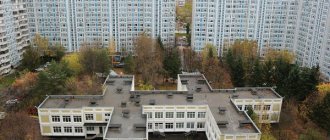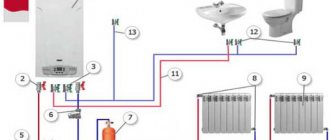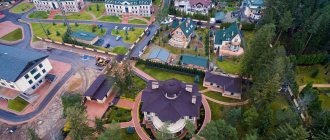Pros and cons of SNT. What you need to be prepared for when buying a dacha in SNT
Gardening areas are not villages with village orders, wide streets, large vegetable gardens and orchards, livestock, etc.
There are no clubs, pharmacies, or first aid stations in SNT; not all gardening centers have shops. The houses are standing close together. The streets are narrow, making it difficult for two cars to pass each other. The first gardening partnerships arose in Soviet times. The government hoped to solve the problem of supplying the population with food. Gardening centers were opened at organizations and enterprises. Each member of the partnership was provided with 6 acres. People used the land to the maximum: they planted gardens, made vegetable gardens, and made sheds or panel houses to store tools.
After the collapse of the USSR, “comrades”—some abandoned their plots due to “raids” of thieves, others sold them. Now gardening is a “mosaic” of abandoned and semi-abandoned plots and permanent buildings. But the layout - with narrow streets and closely packed houses - has been preserved.
The future owner must also be prepared for the fact that all issues related to the arrangement of gardening are decided by the owners. Namely:
- Street improvement.
- Lighting.
- Laying communications and repairing them.
- Garbage removal.
To resolve these issues, the owner must constantly go to meetings to express his opinions and suggestions. All owners, including “dissenters,” comply with SNT resolutions.
You need to know that the new law obliges all owners to pay fees. Previously, only SNT members paid dues. Contributions are collected according to the scheme for utility payments in a “high-rise building”.
People who intend to breed bees, pigs, and other animals, including keeping dogs, will have to ask their neighbors for permission. Not everyone likes barking under the window, the smell of animal manure and the proximity of a hive with bees.
???? What can be built on a summer cottage
Since the concept of “dacha plot” is no longer used in the current Russian legislation, it is necessary to understand that it is necessary to separate what can be built on a plot for gardening and what can be built on a plot for gardening.
Construction of a house for seasonal use
A house for seasonal use is indicated in the text as a garden house. Based on established practice, a garden house or a house for seasonal living is a house where there are no conditions for year-round living. As a rule, this is the lack of heating, sewerage (only a cesspool is available), as well as a central water supply. Previously, only those houses that were built without a foundation were recognized as garden houses: for example, even decommissioned buses could be used as a garden house in the late 90s of the 20th century, the wheels of which were only strengthened with stones so that the bus could not roll away anywhere.
Currently, the situation has changed, and a house for seasonal residence can also be a house built as a permanent structure, that is, with a foundation and often more than one floor.
If we talk about what kind of house can be built on a summer cottage plot, we must first determine: we are talking about a plot defined as a plot for gardening, or a plot for vegetable gardening.
If the house in question is located on a site intended for gardening, then it may be of a capital nature, but if a person does not live in it permanently, it will be recognized as a garden house.
If a house is built on a plot for gardening, then it cannot be permanent, since such construction on such plots is prohibited.
In the event that we are talking about a garden plot where a house will be built (even if in the future it will not be transferred to the category of residential buildings from the category of houses for seasonal residence), there must be some source of water on the site, as well as a toilet .
On a plot for gardening, a house is being built taking into account fire and sanitary standards, but a source of drinking water and a toilet will no longer be required.
Construction of a bathhouse
Here, as in the case of a house, there is a rule for determining the type of plot - for gardening or for vegetable gardening. If we are talking about a plot for gardening, then the bathhouse can be capital, that is, with a built foundation, which cannot be moved. If the location of the bathhouse is planned to be changed, then the bathhouse will only need to be dismantled and a new building erected.
If we are talking about a site for gardening, then the bathhouse should be of the nature of a non-permanent structure: that is, it can, if necessary and desired, be moved to another part of the site using a crane or other mechanism.
Construction of agricultural buildings
Agricultural buildings erected on a gardening site can also be in the nature of permanent buildings - for example, a shed for garden tools, a poultry house, a cellar or other room for storing crops.
If construction is planned on a plot for gardening, then it is possible to erect only such an agricultural building that cannot be qualified as a capital building.
What else can be built
On a plot of land, united by one practical term “dacha plot”, gazebos, summer kitchens, and garages can also be built. But all such buildings (including those listed above) are subject to a number of requirements:
- the structure must meet sanitary and fire safety requirements;
- location from the fence (and the border of the site) at a distance of at least 5 meters;
- between buildings located on the same site, there must be a distance of at least 6 meters, and if we are talking about buildings completely wooden (even if they belong to capital construction projects), then the distance between them must be at least 15 meters (for buildings called partially combustible, this distance is reduced to 10 meters).
Do you know the difference between the concepts of “gardening plot” and “gardening plot”?
I know, I follow the legislation I don’t know I already know - I read it in the article I don’t have a plot of land, so I don’t care
SNT or individual housing construction 2021. Classification of land plots
What is individual housing construction? This is individual housing construction - this is a form of use and ownership of land plots that involves the construction of real estate on them at the expense of citizens’ personal funds.
Plots are provided only to individuals on the basis of ownership or long-term lease.
It is allowed to build capital construction projects with a height of no more than 3 floors on such sites.
Land can be allocated both within the city and in the territories of garden and dacha partnerships and cooperatives. But the legal regulation of land categories is different.
SNT - a gardening non-profit partnership - is an association of individuals with the goal of achieving various gardening and dacha issues.
The difference between SNT and plots for individual housing construction is in the categories of land that are provided to citizens for these purposes.
SNT, as a rule, are located on agricultural lands, and individual housing construction plots are located on the lands of urban settlements.
Purpose
In order to understand what is the difference between individual housing construction and SNT, it is necessary to compare the legal status of individual housing construction and SNT? All lands have a specific purpose.
The lands of urban settlements have the following purposes:
- Construction of residential facilities.
- Providing communications to the population.
- Transport purpose.
- Location of farmland.
- Other.
The lands of urban settlements are intended for:
| For individual housing construction | that is, for the construction of a property intended for year-round use |
| For personal farming | breeding livestock, growing crops, etc. |
| For country house construction | construction of a country house and other buildings that cannot be lived in all year round |
Construction on such sites is permitted only with a special document - a building permit, and all buildings must comply with the urban planning plan of the site.
Lands with agricultural purposes are intended for:
It is possible to build on SNT lands, but only those buildings that are not intended for year-round living, do not have central communications and do not meet the requirements for residential premises.
Purpose of acquisition
A plot for individual construction is purchased, as a rule, for permanent residence or for the construction of a capital construction project.
The secondary cause is farming, horticulture, animal husbandry and horticulture.
As a rule, a plot of land in SNT is purchased in order to have somewhere to go on vacation in the summer, to plant beds and grow crops.
House construction is a secondary reason.
SNT Vinogradovo portal
Gardening in Russia is on the verge of death, said the leader of Russian summer residents
New laws are fraught with many pitfalls
Soon gardening partnerships will suffer the same fate as villages. They will begin to empty out and die out as slowly and heavily as the countryside became empty and wild in the 90s. The process has already started. And the result will not be long in coming. Such an apocalyptic forecast was not made by astrologers or even economists. This prophecy was made by the chairman of the Interregional public organization of gardeners, gardeners and summer residents “Blooming Motherland” Vladimir Shatalinsky in a conversation with an MK correspondent. It turned out that one of the country’s most famous gardeners did not believe in the future of gardening, just as the White Army, after its defeat, did not believe in the revival of tsarism.
— Vladimir Vasilyevich, are you a pessimist?
— I think that I am a realist with a penchant for optimism. And that is why I call a spade a spade.
— At meetings with gardeners and various forums, you assure that cities will soon absorb all gardening partnerships. At the same time, new laws are being issued to protect gardeners.
— Legislators see us only as an object of taxation. That's the problem.
- Explain...
- Let's go in order. Do you know how and why summer cottages appeared in our country?
- Tell me more.
— The first dacha plots began to be issued back in the 30s to various deserving people. The next wave was in 1949. There was a time of famine after the war, and the Council of People's Commissars began to allocate plots to feed people. Then, in 1962, all republics began to distribute land for gardening due to the Cuban Missile Crisis. The garden plots were supposed to serve as shelters for citizens in the event of a nuclear war. And various enterprises of the Union were obliged to provide travel for people to their sites throughout the year. Not just travel (paved roads and clearing snow in winter), but passenger transport. And also water supply, electricity supply... This all really happened. And what did we get in the early 90s? Now all the costs have been passed on to the summer residents. I once talked with power engineers and asked them this question: why do you supply electricity at 168 volts, but set the tariff as if it were already 220. This is a reduced voltage in the network. And what do you think they responded? After two months, they removed the differentiation by voltage levels, leaving only the high level - as if we were getting 0.4 kV, that is, 220 volts.
— What do you see as the future of gardening in the next 5 years? For people who already have dachas. There are unofficial data that 30% of sites in Russia are now abandoned.
— There is one region, I won’t name it, where there are even 60% of abandoned sites. I see one future here: Russia is dying out. And that's a fact. I had a question for the Deputy Minister of Economic Development at the round table, why are you advertising this GDP like that? What does it mean to a person? Never mind. The government is caught up in the race for formal indicators that do not reflect the true well-being of people. Rosstat is now subordinate to the Ministry of Economic Development - also for good reason. Why don't we use the parameters that are accepted in Europe? There is the concept of “availability” of certain food products. The minimum consumer basket is a relative concept. If we measure it by pan-European standards. Here and in Europe this basket is two huge differences. If a European can afford a bottle of champagne every day on a minimum wage, then a Russian can only afford half a glass of water, and not everyone can do that. While officials are reporting on increasing minimum pensions and wages and increasing GDP, Russians are approaching the poverty line. The land no longer feeds them. Peasants today cannot afford farms. If five years ago the cost of a chicken egg produced was 9 rubles, now it is 31 rubles. So calculate how much ten will cost. More than 52 percent of dead villages are now in the Leningrad region. There are less than 10 inhabitants per village. And this trend continues to grow. It's the same in gardening. Now even a garden house is subject to taxation; it has been recognized as residential...
— The Ministry of Economic Development supported the introduction of a simple procedure for recognizing a garden house as residential, to make it easier for citizens to register on garden plots. Why did it happen?
— It all started with a judicial precedent. Mina was laid down by the Constitutional Court. A certain emigrant Vorobyov returned from America. He bought himself a house in SNT and wanted to register there. And Themis allowed him. Although he could easily register with both his mother and his daughter, who live in the Leningrad region. But he didn't. And from this precedent, changes in the law followed. The buildings on the garden plot are now full-fledged residential buildings. You can register in them. But I have a question for legislators: why didn’t they read Ilf and Petrov’s “One-Story America” before writing laws so famously? Why a residential building in a garden community where there is no infrastructure? There are no roads in SNT by law. We only have “driveways” and “dead ends.” With or without turns. Where's the sewer? Where is the school, where is the hospital, where is the infrastructure?
— How did this precedent change people's lives?
“He made my life difficult.” Now I have two residential buildings. This means that one can and should be profitable... And then why do I need the second? It is impossible to live in two houses at the same time. This is the first problem. But the second one is that if you take the Housing Code, you can find formal signs according to which collegial communities of gardeners can now be liquidated. And according to new changes in the law, we are now not non-profit gardening partnerships, but partnerships of real estate owners. We are subject to the Housing Code, which will one day appoint a management company for us. Moreover, someone has already been sent an agreement on managing the gardening partnership. That is, the new law promotes the development of business for a certain circle of people. No more, no less. It does not act in any way for the benefit of man. It was created to bring discord into the lives of gardeners. If earlier - in the 80s - each SNT was given 28 percent of the territory for public land, we, for example, could make a playground on the territory of the SNT. But in gardening partnerships this opportunity no longer exists. And so it turns out that we are killing our generation.
— Are you now talking about the so-called Federal Law No. 217?
- Yes. SNT is turning into a gardening partnership, in which there is not an inch of extra land. Where can children and old people gather? In addition, by allowing the law to register in country houses, even if it is a chicken coop, we will get a large number of migrants who will begin to register in SNT by entire tribal communities and clans.
— What else are gardeners unhappy with?
— In 2021, changes were made to the Housing Code. Now it is possible to forcibly liquidate cooperatives. We fall under this law because we have the characteristics of such a cooperative. They can liquidate us without asking. Further. The forestry department made its own map without approval from Rosreestr. And it turned out that SNT climbed onto agricultural lands. I recently had a lawsuit involving this kind of border crossing. Therefore, I tell you sad news: legislators have removed the issues of squatting of forest lands from the jurisdiction of arbitration courts to the jurisdiction of general courts. And now, as a gardener, I am being issued an administrative fine, which starts at 200 thousand rubles. Not from 10, as before, but from 200 thousand! A fine of 250 thousand was recently imposed in Sergiev Posad for the fact that there is an agricultural water tower next to SNT. They would rather say thank you that there is already a water reservoir here in case of fire.
— Does the transfer of powers from one department to another threaten such consequences?
- Absolutely right. Who and for what purpose gave the right to change the holistic reorganization of Russia? For example, Rosselkhoznadzor was deprived of the right to control the herbicide treatment process. This is an intention! We are going to what the Chinese came to with herbicides. They no longer have bees, and they pollinate the plants by hand - with brushes.
“The lack of bees has now become a problem for us too. Problem number two. In first place, as before, is probably hogweed. By the way, I’ll take this opportunity to ask you this question: if hogweed appears on your site, what should you do?
“As soon as it appears on my territory, I cut off the top and put it in a plastic bag. This is the only way to combat the green pest. Because hogweed seeds can be stored for up to 30 years.
— What are the pressing problems facing summer residents now? If we talk about gardening matters.
- Shrews. They are more of a nuisance than insects. An elementary way has been invented to combat them. Take a small cloth, pour ammonia into it, and into the mink. All.
— You have already answered this question in several remarks. But I would like to summarize. Will the new law No. 217 help gardeners in any way?
- No. And only because this law was written for a different purpose. It is associated with the property of plots, buildings and contributions. This is a law that obliges the creation of a register of owners. In order to subsequently bring a management company to SNT. No more and no less. The main objective of this law is to increase the tax base. There was amateur gardening, but now it is being eradicated. You don’t remember this anymore, but I’ll remind you how it all started. In 1996, 10 days before the elections, Yeltsin signed a decree that exempted gardeners from taxation. They voted for Yeltsin. Exactly 7 months have passed, and he signed a decree abolishing this right.
— Where is the support promised by the government? It must manifest itself in some way.
— The law says that government agencies “have the right” to help gardeners. And the word “has the right” has a special meaning - that is, “they can, but under certain conditions.”
- So, if they want?
- Well, something like this. Now regarding tariffs. Today I can say that in Russia there are thousands of network cable companies that may have, roughly speaking, 2-3 meters of their wire, but when servicing they charge incredible amounts of money for them. Taking into account all own losses that are already included in the tariff. Do you know how it was at first? At first, commissions on tariffs were created, honorable people were elected there who approved these tariffs, then the commissions were removed and replaced with committees. And now this function has been transferred to the antimonopoly service. How can I, an ordinary citizen, understand the rural tariff? If both the village and SNT are powered by one transformer. In the village there is a coefficient of 0.7, but in SNT there is no this reducing coefficient. And if my garden house is recognized as residential, should I now install two meters? Install one in the house and the other in the bathhouse? This is one moment. We also pay for losses in power lines. Insulators have a certain service life. Over time, their losses begin to mount. From 3 to 10 it comes... Who pays? Gardeners pay. At one time, United Russia promised: if United Russia members were in the majority in the Duma, they would halve electricity tariffs. Then the tariff was 50 kopecks per kilowatt. Where are these 25 kopecks? And we, good Slavs, all believe in what we are told.
— I’ll read you a letter from our reader: “We had a rural tariff about 15 years ago, until several villages entered the city limits. Now, even though the address says: Krasnodar, Kalininsky rural district, the tariff is the same as in the city. And everything would be fine, only I have an electric stove in my city apartment - and I pay less than at the dacha with the same electric stove.
- That's what I'm telling you...
— As far as I know, a tax on groundwater will come into force on January 1, 2021: private and legal entities will have to obtain licenses for wells. The corresponding amendment to the law “On Subsoil” will not affect everyone. It is primarily relevant for gardening and dacha partnerships.
“I wouldn’t be surprised if the introduction of a tax on groundwater is followed by a tax on rain.” Yes, until the end of 2021, land owners can dig a well without issuing the appropriate license, but in 2020 this will be fraught with a fine: private individuals will have to pay up to 5,000 rubles, officials - up to 50,000 rubles, and legal entities - up to 1,000,000 rubles. At the moment, citizens are allowed to extract free water in a volume of no more than 100 cubic meters from wells up to 30 meters deep - and most wells near private houses fall under these restrictions. Do you see how new taxes are falling out of the blue to the accompaniment of speeches about how the Russian economy is going uphill?
— Are there any positive changes in the field of gardening? They say, for example, that import substitution has led to positive changes.
— In my opinion, the sanctions did not in any way affect the development of horticulture. It's dying, and that's a fact. There is no escape from this. Law 217, as I already said, is not at all aimed at the development of gardening and the well-being of summer residents. His first goal: to increase the tax base. Today we have a lot of offers for the sale of garden plots. People are not able to support them. The result is obvious. Gardening as a pastime will soon become obsolete.
- And I know one good news. Dead wood in the forest can now be collected.
- But only without an ax and a saw. Manually. Take a twig and take it home. But you can’t saw or chop on the spot, that’s a fine. Have you seen how our forest is neglected? The foresters were given such territories that they cannot cover them purely physically. The forests are simply polluted. How many fallen trunks are there? A very fire hazardous situation arises. I’m from the Urals myself and I remember how they used to take care of trees. And people treated the forest differently. Now no one cares about him.
— I heard that you are in favor of creating a Gardener’s Code. What should be written in it?
— The code should set out the basic provisions and concepts that summer residents encounter. For example, in Germany, according to the Gardeners' Code, if a person uses unauthorized types of chemicals on his property, he is fined. The Code clearly defines everything: the dimensions and parameters of the building, the height of the fences, the list of septic tanks. The Code is designed to protect the interests of people who cultivate their plots. In 2014, we had a congress of gardeners from all over the country; we spent 7 months preparing the provisions of this code, but we have not yet managed to implement it and make it an official document. There are too many contradictions in it with other regulations. Personally, we are against three-story buildings in SNT. Because of them, people in neighboring areas will not see the sun. But the legislation now gives the right to build such huge buildings.
— In your opinion, has the dacha amnesty helped people in any way?
“It gave the tax service a new basis - more accurate information about taxable objects. No more. She did not please mere mortals with anything good. Read my article “Amnesty and Destroy.” You will understand everything.
— How can a summer resident defend his rights if a payment for garbage removal has arrived, but the containers have not yet been installed in SNT? To pay or not to pay?
- This requirement is prescribed by the authorities, so you will not achieve anything. You can, of course, go to court, but you will have to pay a lawyer there.
— Another innovation in the life of a gardener is cashless payments. It is now recommended that all payments be made through a bank. As it was explained to citizens, the collection of money through a non-cash system was established for the transparency of operations. So that the SNT chairmen do not hide funds and their spending is clearly visible. In your opinion, is this the right innovation?
- In my opinion, this is stupidity. It is impossible to indiscriminately accuse the SNT chairman of theft. At one time I myself was the chairman of the audit commission and I know that financial processes are strictly controlled. By the way, in Kaliningrad, summer residents have already been recommended a certain bank where they need to take their money. It turns out that we have to feed the banks. But the operation to withdraw money is a percentage for the bank. Not always, of course, but nonetheless. I wouldn’t be surprised if one fine day a bank called “U-Dacha” opens in the country, and we will be obliged to store the funds of gardening partnerships there.
Source: mk.ru July 24, 2021, 18:30
SNT or IZHS 2021. What is the difference and which is better
The main difference between the categories under consideration is this aspect: the territories of individual housing construction are settlement lands. The state invests money in their development. And SNT participants pay for everything at their own expense.
There are other differences:
- On plots for individual housing construction, you can obtain registration without any restrictions. In SNT, for this it is necessary to go through a lengthy procedure, which involves recognizing the building as residential and suitable for living.
- The territories of gardening non-profit partnerships are acquired for gardening and farming with the possibility of building country houses on them.
- Individual housing construction lands are considered promising, since the local budget allocates financial resources for their development. SNT develops only at the expense of the members of the partnership.
IMPORTANT! When choosing a territory, you should take into account many nuances and know various legal subtleties. It is necessary to clearly outline the purpose for which the site is intended.
To answer the question: “which is better: individual housing construction or SNT”, it is necessary to highlight a number of fundamental points:
- On the site for individual housing construction, it is possible to build residential buildings and cottages. The main thing is that the buildings meet the requirements established by law.
- The construction of any buildings is also allowed on SNT lands. But registration will become problematic, since the building must meet the requirements for permanent residence and have normal infrastructure.
- The cost of land for individual housing construction is more expensive than SNT. If you need a house for a summer weekend getaway, it is better to choose a gardening partnership.
- When it comes to building a house that will be intended for permanent residence, it is advisable to buy a plot of land using individual housing construction.
The advantage of individual housing construction is that local governments are developing the infrastructure of settlements. And the lands of non-profit gardening partnerships are developed only at the expense of its members.
It is difficult to come to a consensus, so everyone must choose a category of land that corresponds to their goals.
To finally understand what is better, whether it is worth transferring SNT to individual housing construction, it is worth noting the disadvantages of building a house in horticultural areas:
- Buildings erected on lands allocated for horticulture or agriculture are not intended for permanent residence. They are considered summer houses.
- Registration is extremely difficult, and in some cases completely impossible.
- Difficulty living in winter in terms of travel.
- Difficulties with gasification, since this issue is not within the competence of the municipality.
Plots of individual housing construction land are in great demand and are considered the most prestigious. It will be easier to obtain a tax deduction for a house built on such a territory.
Conversion of a garden house into a residential building
The procedure for recognizing a garden house as a residential building is regulated by Decree of the Government of the Russian Federation dated January 28, 2006 No. 47 “On approval of the Regulations on the recognition of premises as residential premises...” (as amended on December 24, 2018) (hereinafter referred to as the Regulations).
Requirements for a residential building:
According to Art. 15 Housing Code of the Russian Federation, Art. 4 of the Regulations, residential premises are recognized as isolated premises, which are intended for the residence of citizens, are real estate and are suitable for living, meeting established sanitary and technical rules and regulations, and other legal requirements.
In other words, a residential building must:
- To be built on a foundation, i.e. have a strong connection with the earth;
- Be safe for the life and health of residents;
- Have electricity;
- Be provided with water supply;
- Have a sewerage system (septic tank);
- Be provided with heat supply.
Required documents:
- Application for recognition of a garden house as a residential building.
The application is written in free form with the obligatory indication of the following information:
- Full name of the applicant;
- Postal or email address of the applicant;
- Cadastral number of the land plot;
- Cadastral number of the garden house.
- Method of obtaining a decision from a local government body (in person, by mail, at the MFC).
Sample application: Download
- Extract from the USRN for a garden house. If the garden house is not registered, then the title document for the house (sale and purchase agreement, certificate of inheritance, etc.). Providing an extract is not mandatory.
- Conclusion on the inspection of the technical condition of the object. This document is the basis for making a decision on converting a garden house into a residential one. The conclusion is prepared by a specialized organization or individual entrepreneur that is a member of the SRO in the field of engineering surveys. An example of such a conclusion:
- If the garden house is under mortgage, then the notarized consent of the mortgagee (bank) to re-register the house is required.
Submission of documents to the Administration.
Documents are submitted in person to the Administration or through the MFC. In response, the Administration or MFC specialist issues the applicant a receipt for receipt of documents.
The application review period is 45 calendar days.
Upon expiration of the specified period, the Administration makes one of two decisions:
- on recognition of a garden house as a residential building;
- on refusal to recognize a garden house as a residential building.
In case of refusal, the Administration is obliged to refer in its decision to one of the following grounds for refusal:
- The application does not contain mandatory information (postal address, cadastral numbers);
- There is no conclusion on the inspection of the object;
- The applicant is not the owner of the garden house;
- The Unified State Register of Real Estate does not contain information about rights to a garden house;
- The consent of the mortgagee (bank) has not been submitted;
- The types of permitted use of the land do not include the placement of a house.
An applicant who does not agree with the decision to refuse has the right to appeal it in court within 3 months.
How does SNT differ from Art. Gardening Partnership" or what is SNT, ST, DNP?
Gardening partnerships originate from the Soviet Union. Then it was possible to get a plot of land and a house for use only by joining a team of lovers of country life. Those days are long gone, but land plots in ST still make up a significant portion of the total suburban market.
The concept of “gardening partnership” appeared in Art. 15 of the Civil Code of the RSFSR of 1922. In the Soviet years, these associations had the status of legal entities, acted as land users, collected utility bills, carried out construction with contributions from members of partnerships, etc. The plots in the ST were usually offered small, most often 6 or 8 hundred square meters There were also restrictions on the area of houses - it should not exceed 15% of the size of the plot, the rest of the land was intended for agriculture.
After the approval of the new Land Code, STs could own only public lands (Article 66 of the RSFSR Land Code of 1991). In 1998 Federal Law No. 66-FZ “On horticultural, gardening and dacha non-profit associations of citizens” appeared, which spelled out the possibility of creating a new form of legal entity - a horticultural non-profit partnership (SNT). Previously existing associations of gardeners were to be reorganized into it (Article 53 of the Federal Law 66?FZ). According to Anton Antipov, head of the Sretensky office of the country real estate department, it is unorganized cottage development in SNT that forms the basis of the country market, accounting for about 75% of its total volume.
Individual and collective gardening
Federal Law No. 66 can be organized in several forms at once
- Non-profit collective partnership;
- Individual gardening.
In the first case, plot owners unite to register a garden (dacha, vegetable gardening) non-profit partnership (NPP).
In this case, the SNP will own not only individual plots of the partnership participants, but also all public facilities: which means roads, local sewerage, etc.
Thus, through membership fees, the SNP can pay for the asphalting of local roads, the wiring of electrical networks to the holiday village, etc. A horticultural non-profit association is a legal entity in the full sense of the word.
Article 7 of Federal Law No. 66 determined that the SNP can:
- Acquire and sell property rights;
- Take loans from credit institutions;
- Conclude various types of contracts;
- Act in court as a plaintiff;
- Carry out any other actions that will help achieve the goals set and that do not contradict current legislation.
Any member of the SNP has the right to participate in regular meetings of the partnership and influence the adoption of general decisions.
can be carried out both in a separate place and in a village
In the first case, the owner of the plot has serious problems with the supply of communications to the site (except for those cases when communications are carried out in close proximity to it).
In the second case, when the plot is located directly in the village under the SNP, the owner of the plot has the right to count on common benefits.
He can use the common infrastructure, connect to communications, the connections of which were carried out at the expense of the SNP. But for all this, the owner of the plot must regularly pay contributions to the SNP, established by the association itself.
Status of the house in SNT. Definition of status
Non-profit gardening partnerships unite significant groups of land users on the basis of collective ownership. The category of lands used by them in SNT includes exclusively agricultural lands. Do not confuse it with a plot of land for personal farming.
Some citizens who want to purchase a plot of land at an attractive price ignore seemingly insignificant characteristics, not being interested in the purpose of the land plot.
Subsequently, such frivolity leads to disappointment, and the acquisition becomes a burden.
Land in SNT must be acquired with a focus on the benefits that can be derived from lands of this type of purpose, with a clear understanding of the consequences of their acquisition. You can get acquainted with all types of land plots in the Russian Federation here.
Subjects
Persons exercising ownership of plots on the basis of common use. Their right to own a plot is determined by membership in a non-profit partnership. The basis of the structure is a legal entity that manages and disposes of land use. Naturally, this type of law has a weak individualized basis.
The strength of the structure lies in its corporate nature, which combines elements of the rights of individual members into an integral system of rights to own land resources of high-quality fertile lands. This means that all actions related to the disposal of the site, such as:
- drilling a well for water intake;
- conduction of electricity;
- widening the road to access the site;
- similar works,
can only be carried out jointly or in agreement with the members of the partnership.
Dacha plots of this type have a higher status than, for example, dacha plots of the DNP, where land for the same purpose has lower quality characteristics and belongs to the budget option of real estate.
Purpose
You can build any type of house on SNT lands, with a garage and outbuildings, unless otherwise provided by the internal regulations. Its construction will not be regulated by urban planning restrictions. But when constructing it, you need to understand that no matter what area corresponds to your building, it will not receive the status of a capital real estate object.
It's all about the purpose of the land. When they were allocated for the use of SNT, the construction of country houses, not regulated by the urban planning context, was envisaged. Accordingly, you have permission to build and implement creative plans. However, do not forget that the specifics of the structure and its design in terms of status cannot go beyond the dacha plot.
For many summer residents, these rules are not a hindrance. Today you can often see a picture where modern cottages flaunt against the backdrop of rickety huts.
However, construction standards can be specified in the internal charter of the legal entity SNT. Currently, plots may be allocated that exclusively involve the construction of high-status capital buildings.
This condition is recorded in the documentary support of the partnership and is defined as the provisions of the agreement, on the basis of which there is a real opportunity to be a member.
Own house on the territory of SNT
Before building a comfortable house in an area where there is no water supply and sewerage, geological surveys . Find out at what level the groundwater is. The house can be provided with water by drilling a well and installing a pump.
We are also solving the sewerage issue; we need to dig a septic tank . It will have to be constantly pumped out as it becomes full. But the plus is that sewage can be used as fertilizer. The price of work on installing water supply and sewerage together with equipment is 80-150 thousand rubles . The costs are one-time, but there is complete independence from public utilities.
If the owner decides to build a house, he must ask the neighbors for written permission. Without permission, you can build a house no higher than 3 floors . When laying the foundation, you should calculate the distance to neighboring houses; it should not be closer than 3 meters. After completion of construction, the object must be registered.
Cunning summer residents are delaying the registration of their buildings so as not to pay taxes. Now such a position will hit the summer resident himself. The new law gives an incentive to owners to register buildings. The official registration of the house indicates the presence of people living in the garden, which means:
- The municipality will be required to finance the repair of roads to holiday villages.
- Starting this year, it became possible to transfer roads, power grid facilities, and water supply to the balance of the municipality.
To do this, you need to write an application to the municipality and justify the requirements of SNT. You may have to hire a lawyer, but it will be worth it. Because after the transfer of property to the balance of the municipality, the amount of contributions from owners for the maintenance of the territory will noticeably decrease.
Status of the site and the possibility of construction on it
It is possible to build a house, recognize it as residential and register in it only if the site has the status of farmland and is located on settlement land. Having previously determined the area where the site is located, you can legitimize the construction of the house.
You are advised by the best qualified lawyers
Free: Our lawyers provide free initial consultation on any legal issues. 90% of cases are resolved with one free consultation.
Around the clock: for real estate in an online chat, or use the forms on the website
Any settlement, according to town planning regulations, has residential, business, industrial and other zones. If SNT belongs to a residential area, there is no need to find out the possibility of building a house. You should immediately contact your local administration with a request.
Note!
The application is reviewed within 1.5–2 months. If the decision is positive, you can begin construction and subsequently register in it.
This option can only be used if the site is an independent object, registered and in sole ownership.
If the SNT has common land, and each participant has only a share in it, then you must first obtain data on the standards that are accepted in gardening. This information is found in the constituent documents. gardening.
SNT must have a formal site development plan, which is approved by the local authorities. It contains:
- permissible height of buildings;
- material from which to build;
- various building codes.
The established standards are mandatory for everyone. In case of deviation from them, this will be considered as a violation of contractual relations with the partnership or cooperative.










